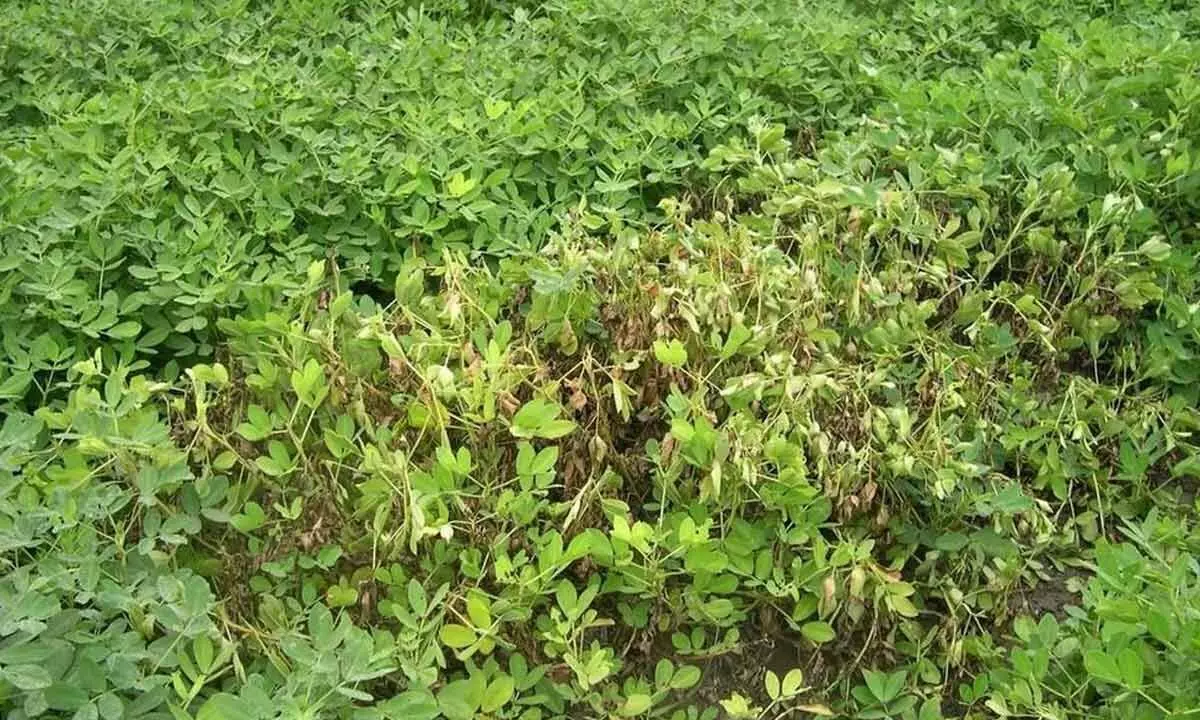Live
- ASI urged to commence Ratna Bhandar repairs
- Eastern region country’s growth engine: PM
- Hyderabad: Woman Crashes Mercedes Benz in Banjara Hills, She Appears Intoxicated
- Traffic cops on the prowl to rein in rogue drivers
- 24,414 may act as strong resistance
- 10 cos gear up to raise Rs 20K cr via IPOs in Dec
- Broad-based trading more likely
- Shocking IPL 2025 Auction: Rishabh Pant Breaks Records with Jaw-Dropping Rs 27 Crore Deal
- Peddireddy Thimmareddy Trust holds 50th medical camp
- Animal Farm: A timeless allegory of power, propaganda and inequality
Just In
Prolonged dry spells worsen farmers’ distress in Anantapur


A view of withering groundnut crop in Anantapur district.
- Except for mild rainfall three weeks ago, rains have eluded the farmers landing them in gloom
- Farmers who sowed groundnut now face the risk of loss of crop due to prospects of no rainfall
- Most of the groundnut crop spread in 20 lakh odd acres is depend on rainfall and therefore is subject to climate volatility
Anantapur-Puttaparthi: Farmers’ distress is a significant issue faced by agricultural communities in many parts of the district. The principal crop being groundnut is spread in 20 lakh acres in the district.
Except for mild rainfall three weeks ago, rains have eluded the farmers landing them in gloom. Farmers who had sowed groundnut now face the risk of withering of crop due to prospects of no rainfall. Farmers in the district like elsewhere, face the risk of crop failures and drought conditions. Many farmers in Anantapur rely on monsoons for their agricultural activities. Irregular or inadequate rainfall can disrupt farming schedules, impacting crop yields and income. Rising costs of agricultural inputs like seeds, fertilizers, pesticides and machinery have posed financial challenges for farmers.
Tungabhadra high level canal irrigates about 1.50 lakh acres and the HNSS project about 3.50 lakh acres. While these two projects take care of agriculture and horticulture crops, most of the groundnut crop spread in 20 lakh odd acres depend on rainfall and therefore is subject to climate volatility.
It impacts the economy of the people particularly farmers and the general populace and all stakeholders.
Implementing crop insurance schemes can protect farmers against crop failures and natural disasters, providing them with financial stability during challenging times. Ensuring easy access to affordable credit, along with debt relief measures, can help farmers manage financial burdens and break the cycle of debt.
Encouraging farmers to diversify their crops and explore value-added products can enhance their income potential and reduce dependence on a single crop or market like the groundnut crop. Insufficient rainfall during the monsoon season can result in crop failures and loss of income for farmers. This can push farmers further into debt and financial distress, exacerbating existing challenges in the agricultural sector. Inadequate rainfall can contribute to water scarcity in reservoirs, lakes and groundwater sources.

© 2024 Hyderabad Media House Limited/The Hans India. All rights reserved. Powered by hocalwire.com






